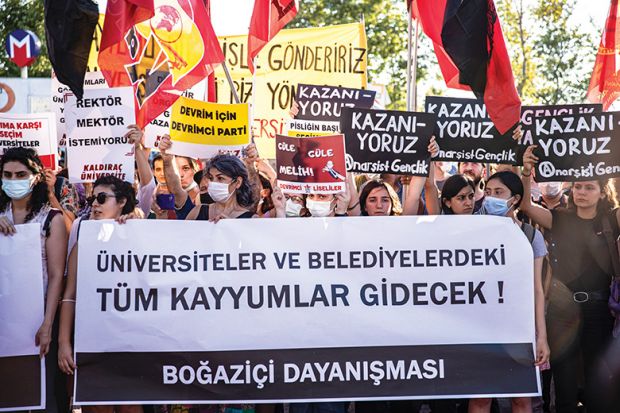Academics in Turkey say they have won a rare victory for university autonomy after a politically appointed rector was dismissed following six months of protest.
The firing of Melih Bulu, a former ruling party candidate who was appointed at Boğaziçi University by the president in January, could be a turning point in the fight for academic freedom, they hope, which has come under intense pressure since a failed coup attempt in 2016.
Professor Bulu’s outside appointment − under a 2018 law that allows president Recep Tayyip Erdoğan to choose rectors – sparked student and faculty protests at Boğaziçi, a highly selective institution with a strong tradition of democratically picking its leaders from within.
On 14 July, Professor Bulu was dismissed by the president without explanation.
“We have forced them to take a step back,” said Feyzi Erçin, a former Boğaziçi music lecturer and lawyer who gave legal advice to students arrested during the protests. “It has shown that by protesting, we can force some change.”
Turkey’s increasingly autocratic government has squeezed institutional autonomy since 2016 with widespread arrests and dismissals of scholars following the failed coup. Last year, a former ruling party MP was appointed head of Ankara University, while dozens of rectors tweet pro-government messages, according to an analysis conducted last year.
But Boğaziçi was seen as Turkey’s “last fortress” against this political encroachment, explained Ödül Bozkurt, senior lecturer in international human resource management at the University of Sussex, and a Boğaziçi alumnus.
Professor Bulu’s appointment triggered the creation of alumni action groups in the UK, US, Sweden, Spain, Germany and Belgium, she said. “I have never seen this level of resilience and imagination in mobilising an entire community,” she added.
His dismissal will have “symbolic power” across the rest of Turkish academia, she said.
The protests had tapped into wider public discontent over political appointees in high places, she explained. “It cut across party lines,” she added.
“Symbolically speaking, we have the upper hand now,” said Zeynep Gambetti, a political theorist and one of the organisers of the protests. “The government is scarred and will have to make concessions.”
Students launched highly visible protests, she said, but faculty had also blocked “several moves by the appointed administrators to confiscate seats in the senate and university council, to interfere in department decisions, to shut the campus off”, she explained.
It is unclear exactly what President Erdoğan will do next. It is possible that he “wants a rector that would mediate these protests and calm the campus, so this may be a political move with election concerns”, said Mine Eder, a professor of political economy at Boğaziçi.
But several campaigners fear that the government will try taking an even harder line against the university.
Acting rector Naci Inci, a physics professor, already appears to have dismissed several opposition figures from their roles. Mr Ercin said he found out last week that his course on film music had been cancelled after eight years of lecturing. The decision “had everything to do with the protests”, he said.
The university reportedly justified its decision by pointing to Mr Ercin’s lack of a PhD or research in his taught field.
Another lecturer, the film-maker Can Candan, also said he had been dismissed by Professor Inci.
Boğaziçi academics are now scrambling to organise their own rector candidates before an application deadline of 2 August set by the country’s Council of Higher Education (YÖK).
“YÖK made an open call for candidates to replace Bulu last week. What we’ll do to defy this is to select our own candidates and say we won’t accept anyone else,” said Dr Gambetti.
The university, its acting rector, YÖK and Turkey’s government all failed to respond to requests for comment.
Register to continue
Why register?
- Registration is free and only takes a moment
- Once registered, you can read 3 articles a month
- Sign up for our newsletter
Subscribe
Or subscribe for unlimited access to:
- Unlimited access to news, views, insights & reviews
- Digital editions
- Digital access to THE’s university and college rankings analysis
Already registered or a current subscriber? Login








